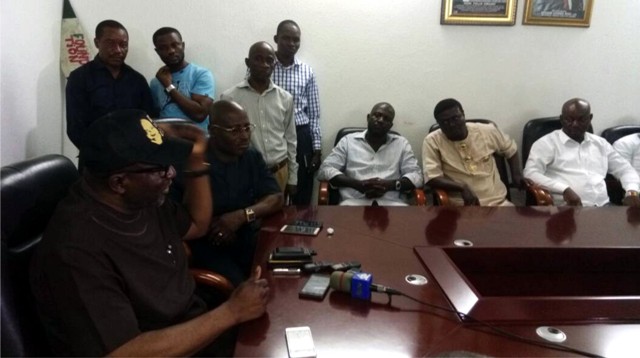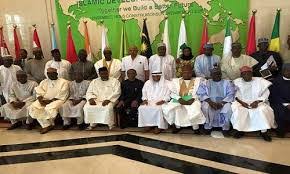Politics
NASS To Make Public 2018 Parliamentary Budget

The Senate Leader, Sen. Ahmad Lawan, said 2018 Budget of the National Assembly would be made public in line with its policy of openness and accountability.
Lawan said this while briefing newsmen on the objectives of the “Open NASS” initiative designed to increase public access to the operations of the national assembly.
Lawan heads the Special Committee set up to organise “Open Week Event” which is scheduled from June 25 to June 29 at the National Assembly Complex.
He described the initiative as an evolving one, adopted by parliaments all over the world.
“Increasingly, governments around the world are promoting initiatives in transparency.
“Governments that are open and transparent are more accountable to their citizens and are less likely to be corrupt.
“Openness generates trust in government and also paves the way for meaningful participation by citizens and more informed and better policies.
“Around the world, an increasing number of parliaments are being more proactive in the provision of information.
“This has become easier with the proliferation of the internet and access to Information Communication Technology (ICT).
“Many parliaments are now uploading significant documents such as daily order papers, draft laws and committee reports for distribution.
“It is against this background that the National Assembly has initiated the Open Week to open the National Assembly to the public,” he said.
Lawan emphasised that the event would broaden public understanding of legislative functions and processes and engender interactions between legislators and key stakeholders.
“Series of activities during the `Open Week’ will include interactive sessions with various interest groups, question and answer sessions.
“It also includes exhibitions and tours, planned over a four-day period to raise awareness on legislative initiative and activities,” Lawan said.
He said that the interactive sessions would feature members of the executive arm of government on the Economic Recovery and Growth Plan (ERGP) and the Judiciary on pre- and post-elections adjudication.
“Others are constitutional separation of powers, a session with state assemblies and a session with trade unions on economic growth and industrial relations.
“Also, there will be sessions with traditional rulers and pressure groups, civil society organisations on accountability and service delivery in governance as well as sessions with women, youth, and student bodies.
“The exercise will feature daily exhibitions for National Assembly Committees to display their outputs and interface with stakeholders via cluster units to be created from both chambers for ease of access.
“The benefits of the Open Week are numerous and have direct bearing on democratic governance in Nigeria.
“Through the Open Week, the National Assembly is fostering public participation in the democratic process.
“Giving the public access to legislative information, activities and policies are substantial steps towards empowering them to take part in political dialogue and decision-making processes.
“Allowing public access to the legislature allows stakeholders to scrutinise our actions as an institution, such public engagement can lead to greater trust in government.
“We have nothing to hide; being able to access this information significantly reduces suspicion and generates trust,” the lawmaker said.
Politics
INEC Denies Registering New Political Parties

The Independent National Electoral Commission (INEC) says it has not registered any new political parties.
The commission gave the clarification in a statement on its X (formerly Twitter) handle last Wednesday.
It described the purported report circulated by some online social media platforms on the registration of two new political parties by INEC as fake.
“The attention of INEC has been drawn to a fake report making the rounds about the registration of two new political parties, namely “Independent Democrats (ID)” and “Peoples Democratic Movement (PDM)”.
“For the avoidance of doubt, the commission has not yet registered any new party. The current number of registered political parties in Nigeria is 19 and nothing has been added,” it stated.
The commission recalled that both ID and PDM were registered as political parties in August 2013.
INEC further recalled that the two were deregistered in February 2020 in accordance with Section 225A of the 1999 Constitution of the Federal Republic of Nigeria.
The commission, therefore, urged the public to disregard the said report.
Politics
You Weren’t Elected To Bury People, Tinubu Tells Alia

President Bola Tinubu has asked Governor Hyacinth Alia to work more for peace and development of Benue State, saying he was elected to govern, not to bury people.
The President said this while addressing stakeholders at the Government House, Markudi, last Wednesday.
He also called on the governor to set up a peace committee to address some of the issues in the state.
The meeting included the Secretary to the Government of the Federation (SGF), George Akume, traditional rulers, and former governors of the state.
The governors of Kwara, Imo, Kogi, Plateau, Ondo, and Nasarawa states also attended the meeting.
“Let us meet again in Abuja. Let’s fashion out a framework for lasting peace. I am ready to invest in that peace. I assure you, we will find peace. We will convert this tragedy into prosperity,” he said.
President Tinubu urged Governor Alia to allocate land for ranching and directed the Minister of Agriculture and Food Security to follow up.
“I wanted to come here to commission projects, to reassure you of hope and prosperity, not to see gloomy faces. But peace is vital to development.
“The value of human life is greater than that of a cow. We were elected to govern, not to bury people”, he stressed.
He charged Governor Alia on working with the Federal Government to restore peace.
“Governor Alia, you were elected under the progressive banner to ensure peace, stability, and progress. You are not elected to bury people or comfort widows and orphans. We will work with you to achieve that peace. You must also work with us”, he said.
In his remarks, Governor Alia appealed to the Federal Government to establish a Special Intervention Fund for communities affected by repeated violent attacks across the state.
“Your Excellency, while we continue to mourn our losses and rebuild from the ashes of pain, we humbly urge the Federal Government to consider establishing a special intervention fund for communities affected by these incessant attacks in Benue State,” he said.
Governor Alia said the fund would support the rehabilitation of displaced persons, reconstruction of destroyed homes and infrastructure, and the restoration of livelihoods, especially for farmers.
He reiterated his support for establishing state police as a lasting solution to insecurity.
The governor pledged his administration’s full commitment to building a safe, stable, prosperous Benue State.
Also speaking at the meeting, the Chairman of the Benue State Traditional Rulers Council, Tor Tiv, Orchivirigh, Prof. James Ayatse, praised President Tinubu for being the first sitting President to personally visit victims in the hospital in the wake of such a tragedy.
He thanked the President for appointing notable Benue indigenes into key positions, including the Secretary to the Government of the Federation and the Minister of Water Resources and Sanitation, Professor Joseph Utsev, while expressing hope that more appointments would follow.
Politics
Gowon Explains Why Aburi Accord Failed
Former Head of State, Gen. Yakubu Gowon (ret’d), says the Aburi accord collapsed because Chukwuemeka Ojukwu wanted regional governors to control military zones.
Gen. Gowon was Nigeria’s military ruler from 1966 until 1975 when he was deposed in a bloodless coup while Ojukwu was military governor of the then Eastern Region in that span.
In a live television interview recently, Gen. Gowon narrated what transpired after the agreement was reached in Aburi, a town in Ghana.
The meeting that led to the accord took place from January 4 to 5, 1967, with delegates from both sides of the divide making inputs.
The goal was to resolve the political impasse threatening the country’s unity.
The point of the agreement was that each region should be responsible for its own affairs.
During the meeting, delegates arrived at certain resolutions on control and structure of the military. However, the exact agreement reached was the subject of controversy.
The failure of the Aburi accord culminated in Nigeria’s civil war, which lasted from July 6, 1967, to January 15, 1970.
Speaking on what transpired after the agreement, Gen. Gowon said the resolutions should have been discussed further and finalised.
The ex-military leader said he took ill after arriving in Nigeria from Aburi and that Ojukwu went on to make unauthorised statements about the accord.
Gen. Gowon said he did not know where Ojukwu got his version of the agreement from.
“We just went there (Aburi), as far as we were concerned, to meet as officers and then agree to get back home and resolve the problem at home. That was my understanding. But that was not his (Ojukwu) understanding,” he said.
Gen. Gowon said Ojukwu declined the invitation, citing safety concerns.
“I don’t know what accord he (Ojukwu) was reading because he came to the meeting with prepared papers of things he wanted. And, of course, we discussed them one by one, greed on some and disagreed on some.
“For example, to give one of the major issues, we said that the military would be zoned, but the control… He wanted those zones to be commanded by the governor.
“When you have a military zone in the north, it would be commanded by the governor of the military in the north, the military zone in the east would be commanded by him. Of course, we did not agree with that one”, Gen. Gowon added.
Ojukwu died on November 26, 2011 at the age of 78.
-
Opinion2 days ago
L’Ouverture:Africa and Echoes of Toussaint
-

 News2 days ago
News2 days agoNEF Decries Benue Killings As Genocide, Calls For Probe
-
News2 days ago
FCCPC Seals France, Belgium, Italy Visa Centre Over Investigation Obstruction, Suspected Unfair Practices
-

 Rivers2 days ago
Rivers2 days agoRivers High Court Judges Begins 2025 Vacation July 21
-
Sports2 days ago
FG Task Private sector for sports dev.
-
Business2 days ago
UYOTA Harps On Commitment To Empower Youths Through Agriculture
-
Opinion2 days ago
Nigeria’s Rendezvous With Floods
-

 Featured2 days ago
Featured2 days ago17 Million Nigerians Travelled Abroad In One Year -NANTA

